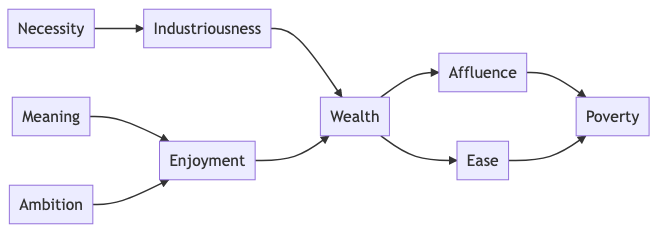In 1805, Playfair 1 attempted to understand the mechanism whereby Netherlands sustained wealth for generation after generation and England seemed on the brink of losing theirs. His conclusion was that the shortest line to wealth was from necessity, which, sparking industriousness, created wealth.
He also proposed a different path through meaning and ambition, which working together create an enjoyment in labour, which created the same sort of industriousness that leads to wealth. He pointed to first-generation immigrants who often feel either necessity or ambition strongly and often turn these prods into wealth. He observed second-generation immigrants, however, routinely turned received wealth into affluence and ease, which inevitably led to a loss of wealth, even poverty.

The Playfair Formula for National Wealth or Poverty
These observations led Playfair to propose citizens learn how to find meaning in work and how to be ambitious.
About 200 years later, Csikszentmihalyi 2 pointed out that the two determining factors of quality of life are experience of work and relationships with people. If true, our society would be best served by creating citizens who experience enjoyment in work and amazing relationships with each other. A small peek around our current society suggests that we have failed at both.
North America currently struggles with what HR people are calling "the great resignation" and a similar social movement in China is called, "lying flat". In Japan in the 2000s it was called the "Freeter" movement. The sentiment appears in songs and movies internationally, for example:
also jieun's "did she suffer for so long
— joon (@iuhyyh) July 24, 2022
just to become me? as the days pile up, we become further apart, i don’t think we will be able to reconcile...when i was young, there was always an ocean that would never run dry in my heart. now in this faint place...only traces remain" pic.twitter.com/xXPbJbAbcb
These movements have (mostly) young people opting out of work in numbers that are truly frightening from a societal perspective.
We like to believe that we're completely different and that affluence and ease have no negative impact on national wealth. Relying on the wealth inherent in our current system, drop outs ignore how quickly systems unravel and how hard rebuilding is once lost. We believe that the results of hard work from previous generations are our birthright to be owned forever. Many in our society have never heard about the consequences of red stew, and are blind to how easy it is to lose benefits received without cost.
200 years ago, these countries or empires boasted of world-class wealth and power: the USA, Germany, Russia, Britain, Netherlands, France, Zulu (South Africa), Ottoman. Today, only the USA maintains a super-power status and former empires have broken up into countries. After losing wealth and power, only China has regained world power status. Which means maintaining power and wealth is preferable to losing it and trying to regain it.
Today's media tell us that youth prioritize "quality of life" over wealth, but returning to Csikszentmihalyi's formulation, the two need not oppose the other. Instead, working with enjoyment and having great relationships would tremendously improve life quality.
Achieving such quality of life additionally retains national wealth, making life much easier. 3
-
Playfair, W. (1805). An inquiry into the permanent causes of the decline and fall of powerful and wealthy nations. Greenland & Norris. ↩
-
Csikszentmihalyi, M. (1990). Flow: The psychology of optimal experience (Vol. 1990). New York: Harper & Row. ↩
-
Photo by DK Dykstra-Lathrop on Unsplash ↩
